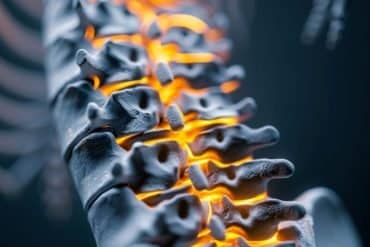Summary: A newly developed AI is able to identify and predict the development of a combination of symptoms associated with chemotherapy.
Source: University of Surrey.
Cancer patients who undergo chemotherapy could soon benefit from a new AI that is able to identify and predict the development of different combinations of symptoms – helping to alleviate much of the distress caused by their occurrence and severity.
In the first study of its kind, published by Scientific Reports, researchers from the University of Surrey and the University of California detail how they used Network Analysis (NA) to examine the structure and relationships between 38 common symptoms reported by over 1300 cancer patients receiving chemotherapy.
Some of the most common symptoms reported by patients were nausea, difficulty concentrating, fatigue, drowsiness, dry mouth, hot flushes, numbness, and nervousness.
The team then grouped these symptoms into three key networks – occurrence, severity and distress. The NA allowed the team to identify nausea as central – impacting symptoms across all three different key networks.
According to Cancer Research UK 360,000 people are diagnosed with cancer every year – with breast, prostate, lung and bowel cancers counting for over half of new cases in the UK. Around 28 per cent of patients diagnosed with cancer in England have curative or palliative chemotherapy as part of their primary cancer treatment.

Payam Barnaghi, Professor of Machine Intelligence at the Centre for Vision, Speech and Signal Processing (CVSSP) at the University of Surrey, said: “This is the first use of Network Analysis as a method of examining the relationships between common symptoms suffered by a large group of cancer patients undergoing chemotherapy. The detailed and intricate analysis this method provides could become crucial in planning the treatment of future patients – helping to better manage their symptoms across their healthcare journey.”
Christine Miaskowski from the University of California said: “This fresh approach will allow us to develop and test novel and more targeted interventions to decrease symptom burden in cancer patients undergoing chemotherapy.”
The other authors of this paper are Tobias Gerhard, PhD (Rutgers University), Stephen Crystal, PhD (Rutgers University), Cecilia Huang, PhD (Rutgers University), Zhiqiang Tan, PhD (Rutgers University), Melanie M. Wall, PhD (University of Surrey Irving Medical Center), Chacku Mathai, AAS (Mental Health Association of Rochester), and Mark Olfson, MD, MPH (University of Surrey Irving Medical Center)
Funding: The study was supported by a Patient-Centered Outcomes Research Institute award (CER-1310-06750).
Source: Dalitso Njolinjo – University of Surrey
Publisher: Organized by NeuroscienceNews.com.
Image Source: NeuroscienceNews.com image is in the public domain.
Original Research: Open access research for “Network Analysis of the Multidimensional Symptom Experience of Oncology” by Nikolaos Papachristou, Payam Barnaghi, Bruce Cooper, Kord M. Kober, Roma Maguire, Steven M. Paul, Marilyn Hammer, Fay Wright, Jo Armes, Eileen P. Furlong, Lisa McCann, Yvette P. Conley, Elisabeth Patiraki, Stylianos Katsaragakis, Jon D. Levine & Christine Miaskowski in Scientific Reports. Published February 19 2019.
doi:10.1038/s41598-018-36973-1
[cbtabs][cbtab title=”MLA”]University of Surrey”New AI Can Identify and Predict Development of Cancer Symptom Clusters.” NeuroscienceNews. NeuroscienceNews, 20 February 2019.
<https://neurosciencenews.com/ai-cancer-prediction-10785/>.[/cbtab][cbtab title=”APA”]University of Surrey(2019, February 20). New AI Can Identify and Predict Development of Cancer Symptom Clusters. NeuroscienceNews. Retrieved February 20, 2019 from https://neurosciencenews.com/ai-cancer-prediction-10785/[/cbtab][cbtab title=”Chicago”]University of Surrey”New AI Can Identify and Predict Development of Cancer Symptom Clusters.” https://neurosciencenews.com/ai-cancer-prediction-10785/ (accessed February 20, 2019).[/cbtab][/cbtabs]
Abstract
Network Analysis of the Multidimensional Symptom Experience of Oncology
Oncology patients undergoing cancer treatment experience an average of fifteen unrelieved symptoms that are highly variable in both their severity and distress. Recent advances in Network Analysis (NA) provide a novel approach to gain insights into the complex nature of co-occurring symptoms and symptom clusters and identify core symptoms. We present findings from the first study that used NA to examine the relationships among 38 common symptoms in a large sample of oncology patients undergoing chemotherapy. Using two different models of Pairwise Markov Random Fields (PMRF), we examined the nature and structure of interactions for three different dimensions of patients’ symptom experience (i.e., occurrence, severity, distress). Findings from this study provide the first direct evidence that the connections between and among symptoms differ depending on the symptom dimension used to create the network. Based on an evaluation of the centrality indices, nausea appears to be a structurally important node in all three networks. Our findings can be used to guide the development of symptom management interventions based on the identification of core symptoms and symptom clusters within a network.






